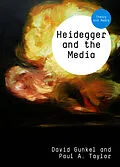The most significant philosopher of Being, Martin Heidegger has nevertheless largely been ignored within communications studies. This book sets the record straight by demonstrating the profound implications of his unique philosophical project for our understanding of today's mediascape. The full range of Heidegger's writing from Being and Time to his later essays is drawn upon. style="text-align: left; text-transform: none; text-indent: 0px; font: 11px Verdana, Geneva, Arial, Helvetica, sans-serif; white-space: normal; letter-spacing: normal; color: #000000; word-spacing: 0px; -webkit-text-stroke-width: 0px;" /> style="text-align: left; text-transform: none; text-indent: 0px; font: 11px Verdana, Geneva, Arial, Helvetica, sans-serif; white-space: normal; letter-spacing: normal; color: #000000; word-spacing: 0px; -webkit-text-stroke-width: 0px;" /> Topics covered include:style="text-align: left; text-transform: none; text-indent: 0px; font: 11px Verdana, Geneva, Arial, Helvetica, sans-serif; white-space: normal; letter-spacing: normal; color: #000000; word-spacing: 0px; -webkit-text-stroke-width: 0px;" /> - an analysis of Heidegger's theory of language and its relevance to communications studiesstyle="text-align: left; text-transform: none; text-indent: 0px; font: 11px Verdana, Geneva, Arial, Helvetica, sans-serif; white-space: normal; letter-spacing: normal; color: #000000; word-spacing: 0px; -webkit-text-stroke-width: 0px;" /> - a critical interpretation of mass media and digital culture that draws upon Heidegger's key concept of Daseinstyle="text-align: left; text-transform: none; text-indent: 0px; font: 11px Verdana, Geneva, Arial, Helvetica, sans-serif; white-space: normal; letter-spacing: normal; color: #000000; word-spacing: 0px; -webkit-text-stroke-width: 0px;" /> - a discussion of mediated being and its objectifying tendenciesstyle="text-align: left; text-transform: none; text-indent: 0px; font: 11px Verdana, Geneva, Arial, Helvetica, sans-serif; white-space: normal; letter-spacing: normal; color: #000000; word-spacing: 0px; -webkit-text-stroke-width: 0px;" /> - an assessment of Heidegger's legacy for future developments in media theorystyle="text-align: left; text-transform: none; text-indent: 0px; font: 11px Verdana, Geneva, Arial, Helvetica, sans-serif; white-space: normal; letter-spacing: normal; color: #000000; word-spacing: 0px; -webkit-text-stroke-width: 0px;" /> style="text-align: left; text-transform: none; text-indent: 0px; font: 11px Verdana, Geneva, Arial, Helvetica, sans-serif; white-space: normal; letter-spacing: normal; color: #000000; word-spacing: 0px; -webkit-text-stroke-width: 0px;" /> Clear explanations and accessible commentary are used to guide the reader through the work of a thinker whose notorious reputation belies the highly topical nature of his key insights. style="text-align: left; text-transform: none; text-indent: 0px; font: 11px Verdana, Geneva, Arial, Helvetica, sans-serif; white-space: normal; letter-spacing: normal; color: #000000; word-spacing: 0px; -webkit-text-stroke-width: 0px;" /> In a world full of digital networks and new social media, but little critical insight, Heidegger and the Mediashows how a true understanding of the media requires familiarity with Heidegger's unique brand of thinking.
Autorentext
David Gunkel is professor of communication at Northern Illinois University. He is the managing editor of the 'International Journal of Zizek Studies'.
Paul A. Taylor is associate professor in the Institute of Communication Studies at the University of Leeds.His previous publications include Zizek and the Media (Polity, 2011). He is the General Editor of the 'International Journal of Zizek Studies' and Editorial Board Member of the 'International Journal of Baudrillard Studies', 'Fast Capitalism' and the 'International Journal of Badiou Studies'.
Inhalt
Introduction
1 We Need to Talk About Media
2 Mediated Truth
3 In Media Res
4 The Dasign of Media Apps: The Questions Concerning New Technologies
Conclusion
